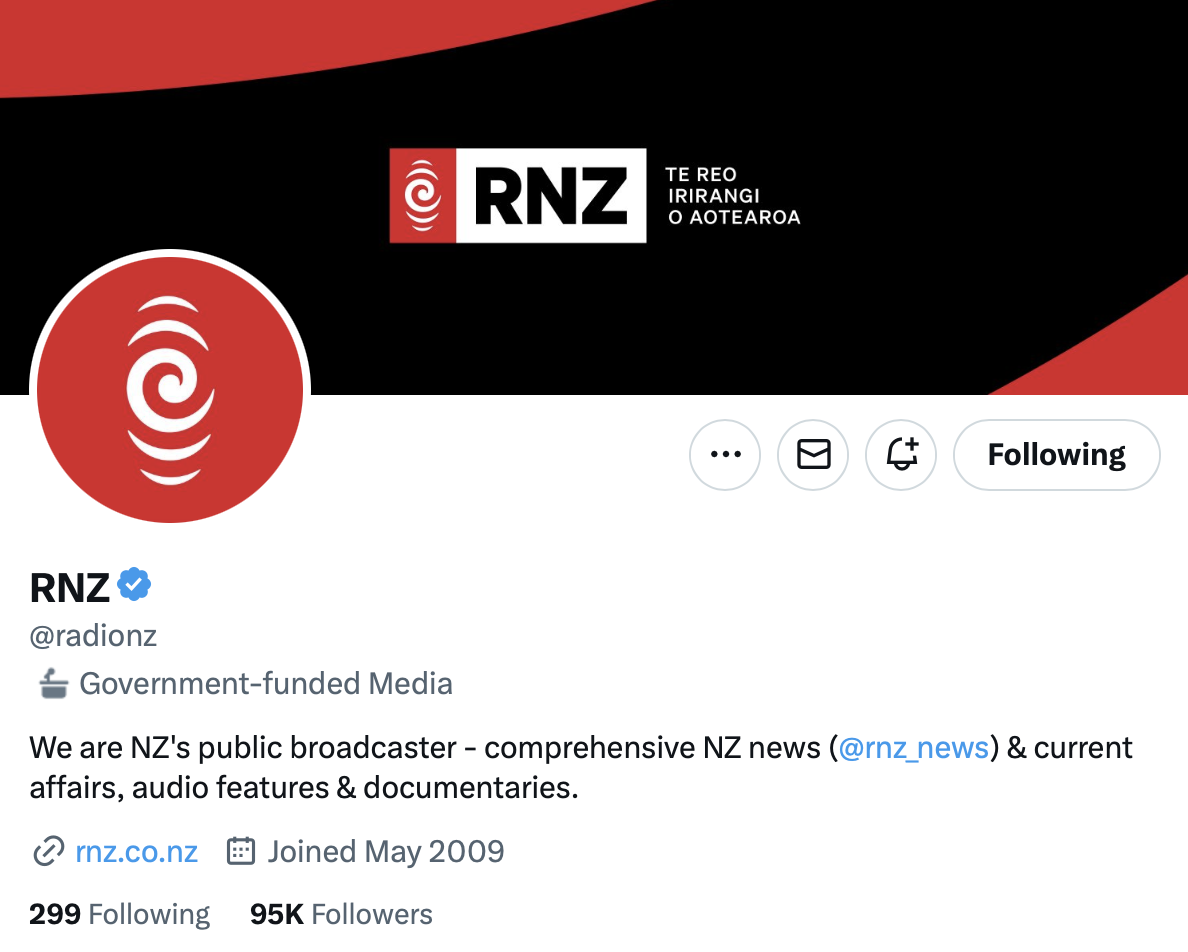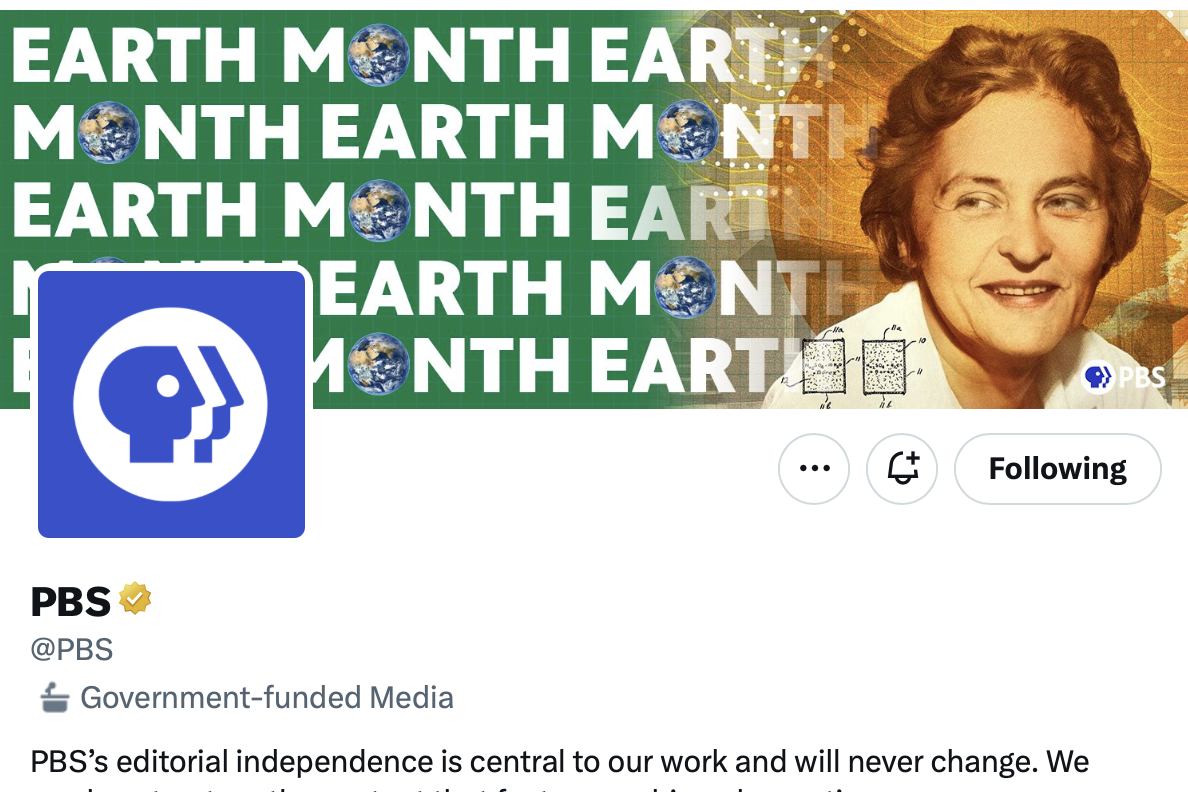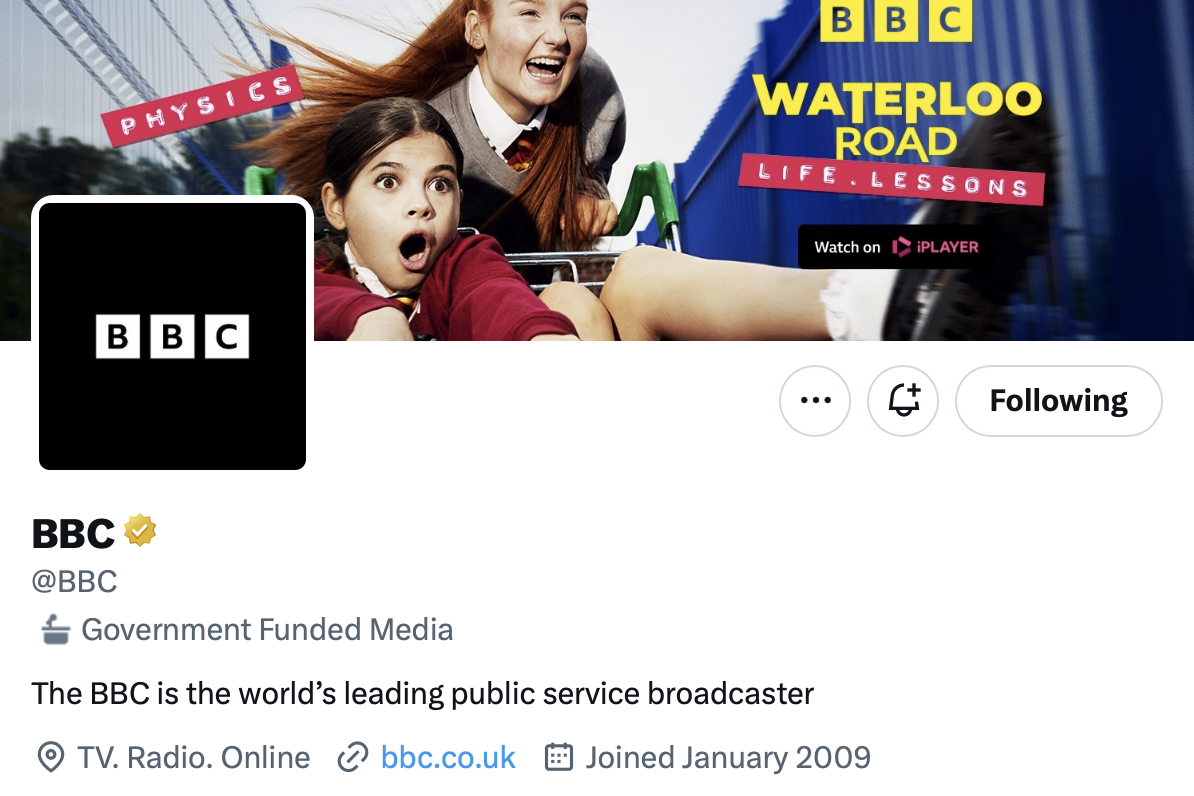PSM threaten to leave Twitter
18th April 2023
Independent public service media have threatened to leave the social media network, Twitter, due to inaccurate classification.
On Monday, Twitter ramped up its ‘policy’ of labelling public service media (PSM), with dozens now classified as either “Government-funded” or “publicly-funded”.
At the time of writing, PMA has reviewed the accounts of more than 50 PSM across the world, and the results demonstrate an inconsistent and incoherent patchwork of labels. NPR and PBS – amongst the first broadcasters to be labelled last week – continue to be classified as “Government-funded”. They have now been joined by ABC, CBC/Radio-Canada, KBS, MBC, Rai, RNZ, RTVE and SBS.
Others, such as France Télévisions, NHK, RTÉ, SVT, Swedish Radio and Yle, have been defined as “Publicly-funded”, as have the BBC after they complained directly about being termed as “Government-funded” last week.
Still many public broadcasters have avoided labels completely – even in countries where one PSM has already been labelled. The UK’s Channel 4, New Zealand’s TVNZ and have both escaped labels. Continents such as South America and Africa appear to be unaffected.
It appears where possible, Twitter has only tagged the English-language accounts.
The Public Media Alliance has been concerned since the beginning of this debacle and has previously warned of the damage to trust in PSM these misleading and inadequate labels could cause. Terms such as “Government-funded” create an illusion that PSM is beholden to government, whereas independence is much more faceted and nuanced. This is the point which has been made by numerous broadcasters who have been described as “Government-funded”.
PSM Response
“PBS’s editorial independence is central to our work, and will never change,” said PBS in a statement provided to PMA. “We will continue to produce trustworthy content that features unbiased reporting and holds governments and institutions to account.
“Twitter’s simplistic label leaves the inaccurate impression that PBS is wholly funded by the federal government. PBS is primarily funded by the public and philanthropic organizations, with only a small portion of our funding coming from entities affiliated with government.”
PBS alongside NPR decided to stop using Twitter last week. “PBS stopped tweeting from our account when we learned of the change and we have no plans to resume at this time.”
They are now being joined in this decision by other PSM. CBC/Radio-Canada announced on 17 April that they would be pausing all activity on all their Twitter accounts. “We cannot in good conscience continue to post fact-based news and information to Twitter, or engage on it, while a false impression of government involvement in our work is allowed to stand. As a news organization committed to truth, facts and accuracy, we cannot abide by a label that promotes disinformation about who we are and what we do.”
Our journalism is impartial and independent. To suggest otherwise is untrue. That is why we are pausing our activities on @Twitter. | Notre journalisme est impartial et indépendant. Prétendre le contraire est faux. C’est pourquoi nous suspendons nos activités sur @Twitter.
— CBC/Radio-Canada (@CBCRadioCanada) April 17, 2023
RNZ has threatened to do the same. “RNZ’s editorial independence is enshrined in our charter and editorial policy,” said Megan Whelan, the broadcaster’s Head of Content. “Twitter’s own policy defines government-funded media as cases where the government “may have varying degrees of government involvement over editorial content”, which does not apply to RNZ.
“Over the next few days, we will be considering our options, [i]ncluding talking to Twitter to have the label removed or revised, or as other public media around the world have done, leave the platform.”
Meanwhile, in Australia, the ABC said it was “liaising with Twitter”, and an SBS spokesperson told SBS News, “While we appreciate Twitter’s motivations with regard to transparency on its platform, we believe a “Publicly-funded media” label better reflects the hybrid public-commercial nature of our funding model and the fact that SBS retains full independence from Government in our news editorial and content decision making.”
Listen toour podcast
Uncovering and exploring the biggest
issues facing public media
Spain’s public broadcaster, RTVE, also expressed its unhappiness with the label. “These tags on RTVE’s Twitter accounts are erroneous and contrary to the essence of Radiotelevisión Española,” the broadcaster said in a statement. “The Corporation reiterates editorial independence as one of its hallmarks.” RTVE has asked Twitter to instead replace it with the “Publicly-funded” label.
So far, the broadcasters who have either suspended, quit, or threatened to quit Twitter in protest are those labelled as “Government-funded”. But Swedish Radio – labelled “Publicly-funded” – has made the announcement that they too will no longer use Twitter, although not in relation to the labelling. Instead, Swedish Radio’s departure is because “Twitter has simply changed over the years and become less important for us,” said Christian Gillinger, Swedish Radio’s Head of Social Media. Only seven percent of Swedes are on the platform, “And we have noticed that reduction over the years, in the form of less dialogue and fewer interactions with our tweets. The audience has simply chosen other places to be.”
Mr. Gillinger did however note the “the recent turbulence around the platform” including mass layoffs at the company. “We believe that in the long run it may affect the company’s capacity to handle, for example, fake accounts, bots and misinformation, but also hate and threats. … We think it is important that when Sveriges Radio is on a platform, our presence should be good, with dialogue with the audience and with well-thought-out publications. … What ultimately governs must always be our editorial goals, and the work with that prioritisation is done on an ongoing basis.”
Social media is a critically important space for public service media. The ubiquity of social media is part of the reason why PMA describes these organisations as ‘public service media’ rather than ‘public service broadcaster’. Social media provides an opportunity for PSM to connect and reach audiences – and particularly younger, more diverse audiences – to fulfil their public service mandate. It also benefits the environment in which they operate. The presence of PSM ensures the provision of accurate and trusted sources of news, which in turn helps to counteract the extreme mis- and disinformation that can flourish on social media networks.
While it is a comparatively small platform in terms of users, it has an outsized influence and impact. This is why Twitter’s mislabelling – in driving PSM to leaving the platform – is so consequential. Some PSM clearly feel that, while they are mis-labelled, there is more harm in staying on the platform than there is in leaving. This is a serious error from the social network, and PMA once again implores its management to reconsider their policy.
Related Posts
9th April 2023
“Government-funded Media” Twitter label must be removed
PMA calls for Twitter to reverse its…



